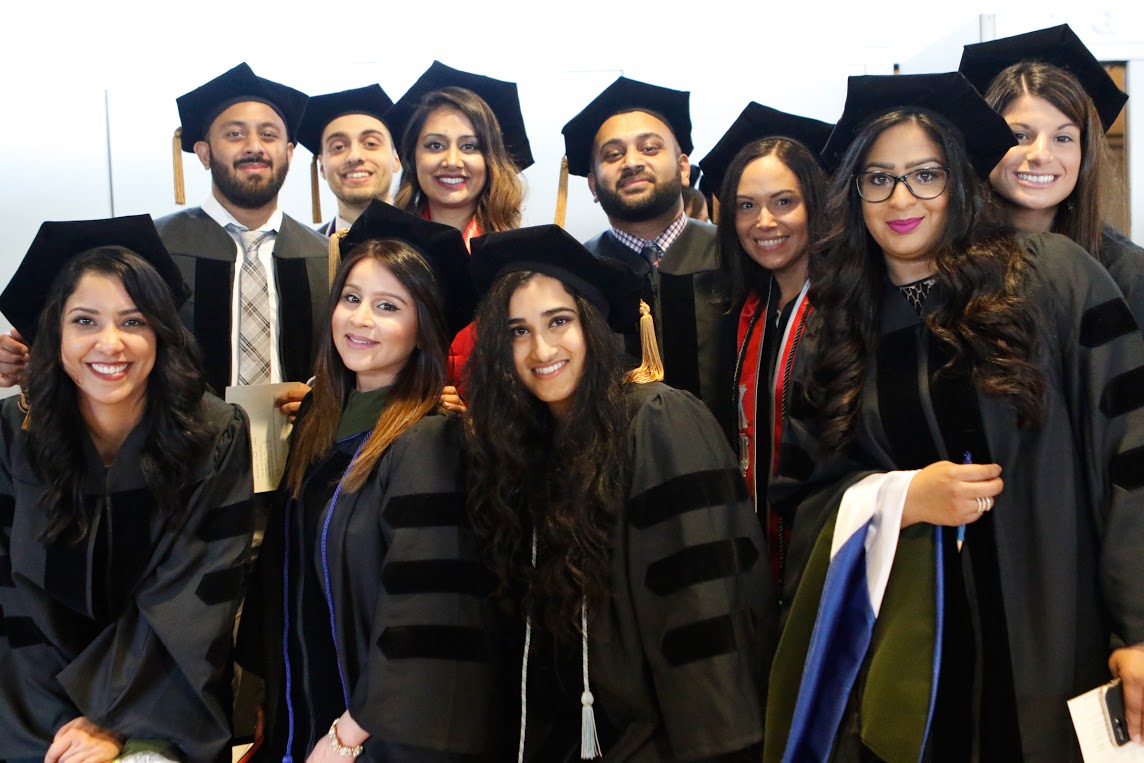Touro College of Pharmacy Graduates Sixth Class
Opportunity Ahead for New Pharmacists - Future is Bright, with Change and Challenges

New York, N.Y. – The sixth graduating class of the Touro College of Pharmacy took their oaths and received their PharmD degrees at commencement exercises held at Columbia University’s Roone Arledge Auditorium last week.
Surrounded by family members, friends and other well-wishers, the spirited ceremony celebrated four years of rigorous coursework, community service, extensive training in medication management and numerous rotations in a variety of healthcare settings.
After four years of working together, the 97 graduates will be pursuing a variety of different paths. Some will continue their education with postgraduate residencies or fellowships but the majority will work in retail or hospital pharmacies, in clinics, or for drug companies, public health organizations or government agencies.
Regardless of where they are headed, the new pharmacists will be encountering change, opportunity and challenges.
Touro College and University System President Dr. Alan Kadish, in reminding the graduates of Touro’s and their own individual commitments to improving society, noted that they are entering pharmacy practice at a time when the healthcare system is facing significant challenges.
“How pharmacists will function in a world where distant pharmacies and computer-filled prescriptions are becoming the norm all represent challenges to professional practice. Whatever the challenges appear to be, and however complex your lives seem, one individual can really make a difference,” the President said. “One of the keys to making that difference is perseverance and commitment.”
Increased Respect for Pharmacists
Change and opportunity were resounding messages delivered by keynote speaker Darryl S. Rich, PharmD, M.B.A., Medication Safety Specialist at the Institute for Safe Medication Practices. Dr. Rich said when he began his career, pharmacists were limited to community or hospital pharmacy practice. Also, pharmacists were respected by the public for their advice but not by doctors for their clinical knowledge of drug therapy.
“I can’t tell you how many times I called a physician to tell him that their prescription would harm the patient, only to be yelled at, asking who I thought I was to dare challenge him or her,” he recalled.
Today all pharmacists are recognized as being part of a clinical profession and the PharmD is the standard degree. The role of the pharmacist has expanded, even in hospitals to include such areas as emergency departments, radiology and operating rooms. Board certification now includes 10 areas of pharmacy practice and residency training has expanded beyond hospitals to community pharmacies and managed care settings. And, respect for the pharmacist has increased beyond the pharmacy setting.
“Physicians know and respect the clinical knowledge and skills of pharmacists – not only accepting but demanding that they be part of the team in the care of the patient,” Dr. Rich said. This increased recognition extends to health care management and leaders in other areas of the industry in the use of medications and medication safety, he added.
“Do No Harm”
As much as things have changed, they will continue to change, so the graduates should be flexible in their career goals and continue to learn. Importantly, as they go about their daily work they should also be mindful of their oath to “do no harm.”
“You will become responsible for the health, safety and well-being of individuals as it relates to their medication therapy…Make sure you provide care the way you would want care provided to you or your loved ones. Medication safety should be a priority in everything you do.”
Dean Henry Cohen, PharmD, in his closing remarks, reinforced the theme that career choices and opportunities abound.
“You may be the clinical pharmacist who provides the antibiotic drug regimen for a patient with life-threatening pneumonia, or who sees patients with heart diseases, does a targeted physical exam, orders blood tests and prescribes anticoagulants to prevent strokes. Your opportunities to help patients and society are endless,” the Dean said. In so doing, “Serve as a mentor and teacher, and maintain the highest level of professional and moral character.”
About the Touro College and University System
Touro is a system of non-profit institutions of higher and professional education. Touro College was chartered in 1970 primarily to enrich the Jewish heritage, and to serve the larger American and global community. Approximately 18,000 students are currently enrolled in its various schools and divisions. Touro College has 30 campuses and locations in New York, California, Nevada, Berlin, Jerusalem and Moscow. New York Medical College; Touro University California and its Nevada branch campus; Touro University Worldwide and its Touro College Los Angeles division; as well as Hebrew Theological College in Skokie, Ill. are separately accredited institutions within the Touro College and University System. For further information on Touro College, please go to: www.touro.edu/news
Media Contact:
Barbara Franklin
Director of Communications
646-565-6530
Barbara.franklin@touro.edu

